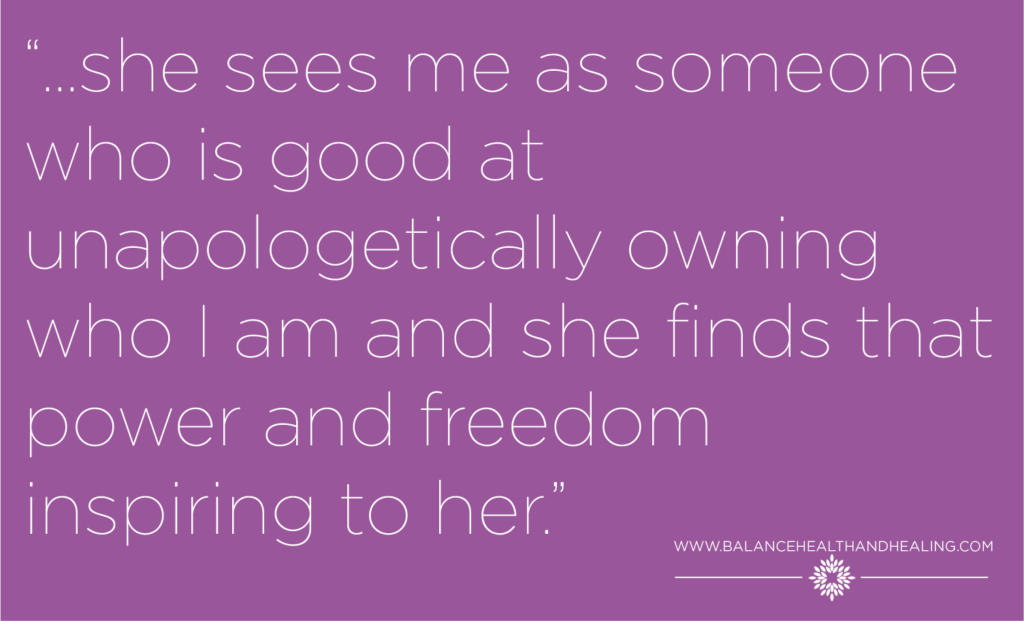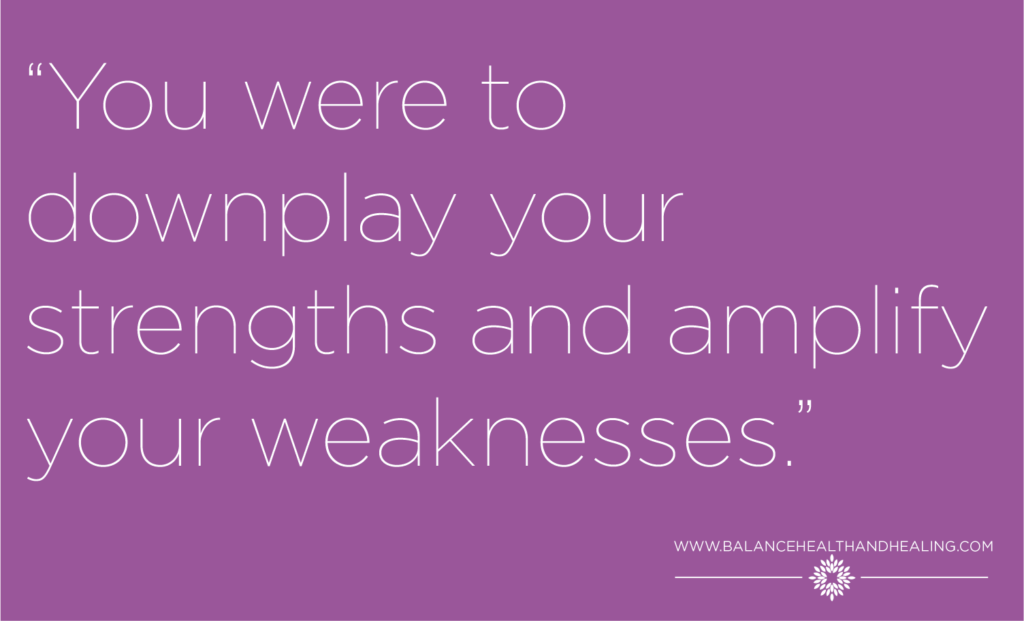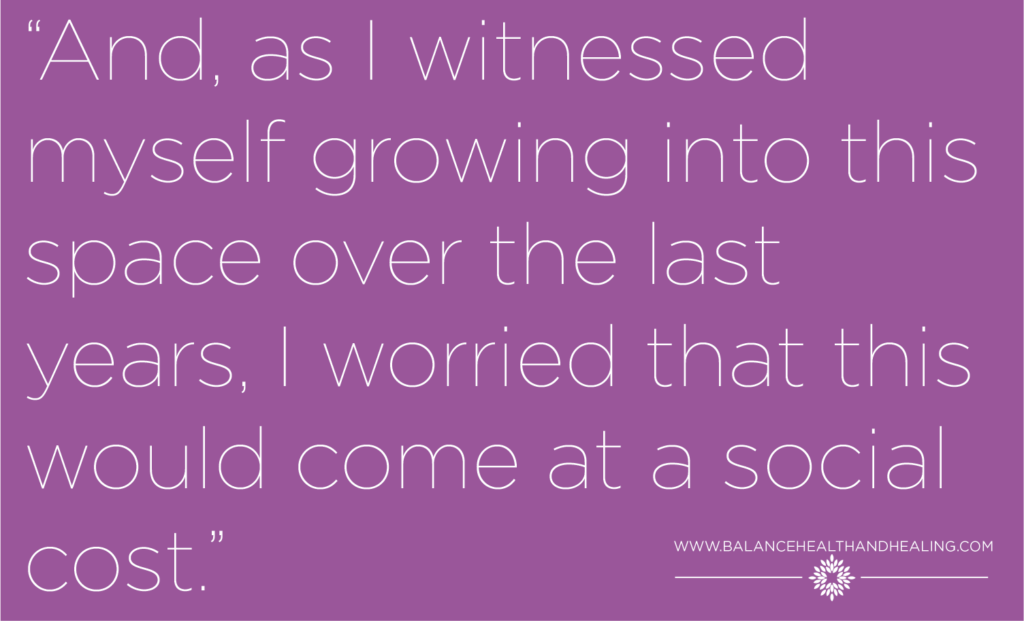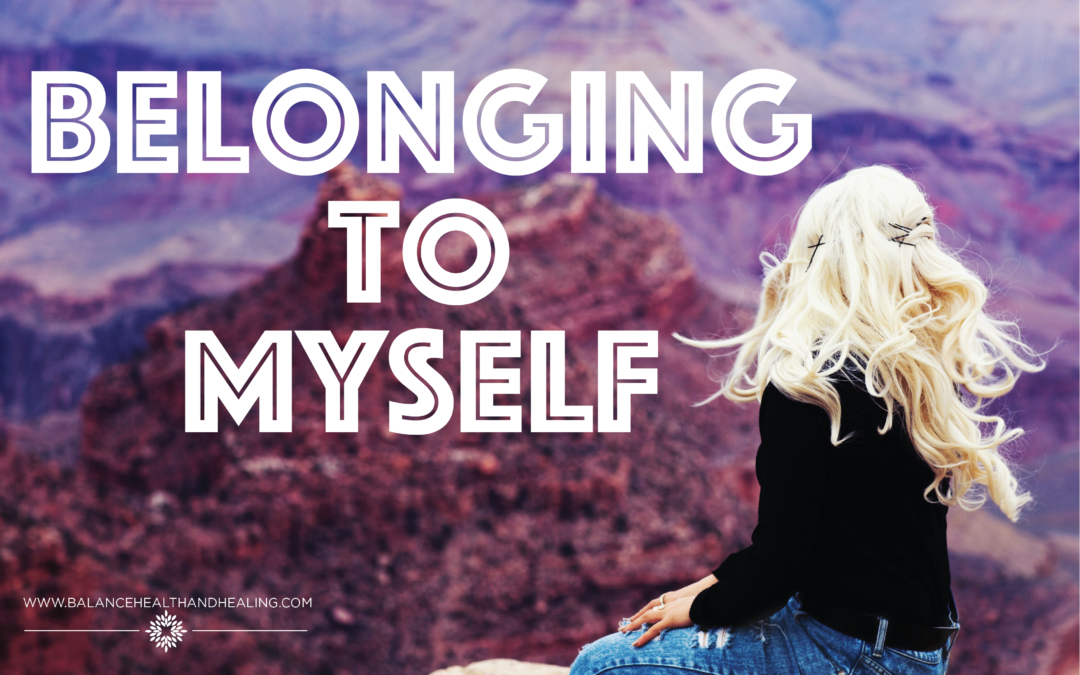Last week I said goodbye to a long-term client as she moved away. In parting, she gave me a card with a quote on the front that said, “I’m a grown ass-lady and I do what I want.” She then explained in the letter that she sees me as someone who is good at unapologetically owning who I am and she finds that power and freedom inspiring to her.
want.” She then explained in the letter that she sees me as someone who is good at unapologetically owning who I am and she finds that power and freedom inspiring to her.
I didn’t expect that card to crack me open in the ways it did. I found myself tearing up on the commute home as I sat with her beautiful compliment. To understand this impact, I need to take a journey back in time.
In high school, I struggled socially. I had a really hard time connecting with and befriending girls in my school. I “passed” enough but never felt like I fit in. I felt I was missing some sort of memo that all the other girls received but wasn’t delivered to me. I felt “off” and that I didn’t know the unspoken female rules everyone else seemed to be playing by.
Maybe only having brothers to socialize me, led to a higher learning curve on how to be a socially acceptable female. Or maybe it was something else about me that I still don’t have insight around.
Regardless, high school was an acute experience of “otherness” and where I began to work in earnest to find belonging and acceptance. One of the first things I remember learning, is that girls don’t accept compliments. There was a social rule to excessively and profusely compliment each other on outfits, hair, and make-up, but you could never accept the compliment. Instead you had to respond with self-deprecating exclamations and denial. “Oh no, I look so horrible!”
I remember learning that confident girls were targets for destruction. This was done through gossip and clever subterfuge that only high school girls can create. It all starts with, “Who does she think she is?” and continues with mean girl hacks to socially ostracize the confident girl, thus destroying her self-esteem and neutralize the threat that a confident female possesses.
 Girls socialized each other to connect around insecurity. You could do well at things, as long as you didn’t perform too well, and as long as you never admitted your successes. You were to downplay your strengths and amplify your weaknesses. I learned that belonging required shrinking and minimizing, and also turning on anyone that didn’t follow the same rules.
Girls socialized each other to connect around insecurity. You could do well at things, as long as you didn’t perform too well, and as long as you never admitted your successes. You were to downplay your strengths and amplify your weaknesses. I learned that belonging required shrinking and minimizing, and also turning on anyone that didn’t follow the same rules.
(Note: I know not all women have this same experience in high school. Some have harder experiences and some have easier experiences).
I never found the belonging I yearned for. To this day I still don’t know why I repeatedly experienced soft and subtle and also overt and painful social rejection. I’ve also decided not to spend any more of my energy trying to figure it out…because I never will. But a residue from that history was an ongoing sense that finding belonging with women is hard for me. I tried for years to abide by the social rules that would optimize my chances of finding friends.
Don’t be too much. Don’t be too confident. Don’t, “have it all together.” Don’t be too successful, smart, or ambitious. I could go on. But in short, I learned that confidence fostered intimidation, disconnection and competition. Whereas insecurity fostered connection.
These beliefs changed in important ways over the next decade and took on much healthier and adaptive flavors. As I healed from an eating disorder, gained confidence in my abilities and who I am, I started to break free from these unhealthy rules. For example, I remember making an overt decision that when I got compliments, I would say, “Thank you” instead of rejecting them through self-deprecation. Over time, I learned to cast off the idea of playing small and got in touch with my true yearnings and big dreams. I blazed a difficult path to grad school and succeeded in getting my PhD.
But I kept some beliefs about making sure I didn’t take up “too much space.” I remember that I continued to find connection, mentorship, and friendship around vulnerability. This vulnerability felt healthier and more adaptive than the “gamey vulnerability” in high school. It was authentic. It felt more in-line with the vulnerability that Brene Brown advocates for. For example, I had beautiful experiences connecting around distress, and discomfort with my fellow grad students as we started seeing clients for the first time. We had no idea what we were doing and there was camaraderie in this messiness.
Today, I still find connection with close and trusted friends around vulnerability. And I have also grown and feel more confident as the years go by.
Of course I still have insecurities and there are parts of me and my life that I keep working on. But I’ve stopped shrinking and I’ve stepped more completely into my strengths and confidence. I really love living this way. I love that as I turn away from my insecurities, I live more presently, outward.
And, as I witnessed myself growing into this space over the last years, I worried that this would come at a social cost.
Glennon Doyle shared a similar experience in Untamed, “I was speaking at an event recently, and a woman stood up in the audience, looked at me onstage, and said into the microphone, ‘Glennon, I used to love your writing so much. When you talked about your pain and how hard life, I felt so comforted. But lately, with your new life, you seem different. I have to be honest; I am finding you harder and harder to relate to.’ ‘Yes,’ I said, ‘I understand. I’m happier now. I’m not doubting myself as much, and that is making me confident and stronger, so I’m suffering less. I have noticed that is seems easier for the world to love a suffering woman than it is for the world to love a joyful, confident woman.’ It’s hard for me too.”…”Strong, happy, confident girls and women are breaking our culture’s implicit rule that girls should be self-doubting, reserved, timid, and apologetic. Girls who are bold enough to break those rules irk us. Their brazen defiance and refusal to follow directions make us want to put them back into their cage.” (Cue my high school experience all over again)
microphone, ‘Glennon, I used to love your writing so much. When you talked about your pain and how hard life, I felt so comforted. But lately, with your new life, you seem different. I have to be honest; I am finding you harder and harder to relate to.’ ‘Yes,’ I said, ‘I understand. I’m happier now. I’m not doubting myself as much, and that is making me confident and stronger, so I’m suffering less. I have noticed that is seems easier for the world to love a suffering woman than it is for the world to love a joyful, confident woman.’ It’s hard for me too.”…”Strong, happy, confident girls and women are breaking our culture’s implicit rule that girls should be self-doubting, reserved, timid, and apologetic. Girls who are bold enough to break those rules irk us. Their brazen defiance and refusal to follow directions make us want to put them back into their cage.” (Cue my high school experience all over again)
So when my client gave me this card that spoke directly to my confidence, I had two reactions. First was, “Oh no, did I show up as TOO much? I didn’t play this right!” And then I stopped myself and internalized her message which told me that I inspired her. My confidence inspired her! I literally felt my mind “blown” around this experience.
I hope we, as women, re-work our socialization around what is acceptable for us to be and do and how to connect with one another. To quote Glennon Doyle again, “I’m also going to quit requiring modesty from other women. I don’t want to find comfort in the weakness and pain of other women. I want to find inspiration in the joy and success of other women. Because that makes me happier, and because if we keep disliking and tearing down strong women instead of loving them, supporting them, and voting for them, we won’t have any strong women left.”
I feel deep gratitude to my client for her unexpected parting gift to me. This is the first time I can remember that someone overtly THANKED me for taking up space and embodying myself and my life the way I do. I want to convey a BIG THANK YOU back to my client. This makes me feel so hopeful for us as women. Hopeful that it can be acceptable, and even valued, to be a strong woman. Hopeful for me, that I can find more belonging from a place of strength. Hopeful for the daughters I am trying to raise as strong, resilient, women.
I want us ALL to step into our strengths as women and celebrate with each other in these strengths. I want us to learn how to connect from this place. We are stronger when we stop apologizing and playing small, and we are stronger together.

